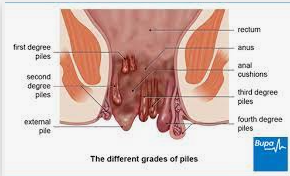What are Haemorrhoids? Its Types, Symptoms, Causes and Treatment
What are Hemorrhoids?
Hemorrhoids are swollen and enlarged veins that appear inside and outside the anus and rectum. Due to this one feels uncomfortable and painful. Hemorrhoids are also called hemorrhoids. We all have hemorrhoids, but most of them don’t bother us. Symptoms of irritation appear only when it swells and grows.

Overview
Hemorrhoids (HEM-uh-roids) are veins in the anus and deep rectum, similar to varicose veins, called hemorrhoids. Hemorrhoids can occur in the rectum (internal hemorrhoids) or under the skin around the anus (external hemorrhoids).
About three in three adults will have hemorrhoids. There are many causes of hemorrhoids, but usually, the cause is unknown.
Fortunately, there are effective options for treating hemorrhoids. By changing our lifestyle we can find relief from it.
Also Read:
- Division of Global Health Protection | Global Health Protection Programme
- The Food and Water System – Softpik Topics
Types of Haemorrhoids
External hemorrhoids
These are found under the skin around your anus. Signs and symptoms may include:
- Itching or itching in the anal area
- Pain or discomfort
- Swelling around the anus
- Bleeding
Internal hemorrhoids
Internal hemorrhoids are located in the rectum. They are usually not seen or heard and rarely cause confusion. However, if you feel awful or irritable when you have a bowel movement:
Painless bleeding during bowel movements, You may see a little red blood in your toilet drain or toilet. Hemorrhoids (enlarged or protruding hemorrhoids) for holes, causing pain and irritation
The blood vessels around the anus tend to stretch under pressure and may be swollen or inflamed. Low Rectal Pressure Can Cause Hemorrhoids:
Cause of Hemorrhoids
There are a few causes of Hemorrhoids:
- Difficulty defecating
- They sat on the toilet for a long time.
- If you have persistent diarrhea or constipation
- obesity
- Abdominal pressure due to weight gain, especially during pregnancy
- Difficulty with bowel movements (movement) due to constipation
- Difficulty lifting or lifting heavy objects
- For real
- Anal
- Eat a low-fiber diet
- Regular weight lifting
How can I treat Hemorrhoids at Home?
Hemorrhoids usually finish their own without treatment. Symptoms such as pain and bleeding can persist for a week or more. In the meantime, you can take the following steps to alleviate your symptoms:
- Use an over-the-counter cream containing lidocaine, witch hazel, or hydrocortisone on the affected area.
- Drink plenty of water.
- Increase fiber intake with food and supplements. Limit your fiber intake to at least 20-35 grams per day.
- Soak in warm water (sitz bath) for 10 to 20 minutes daily.
- Take a diuretic.
- Avoid non-steroidal anti-inflammatory drugs (NSAIDs) for pain and inflammation.
Use oil-soaked toilet paper or a damp cotton swab to bite down on urine, then gently squeeze it underneath. You can also use tissue or a soaked towel. (Don’t throw towels away, don’t put them in the trash. Wash towels separately in warm water to prevent the spread of common fecal bacteria.)
How can I Prevent Hemorrhoids?
Hemorrhoids are more common in older people. These steps can help prevent hard stools and constipation that can cause hemorrhoids:
- Don’t sit too long and don’t push too hard on the toilet.
- Go to the toilet when the urge arises – don’t hold your bowels.
- Drink plenty of water throughout the day.
- Eat high-fiber foods (fresh fruits, vegetables, and whole grains) or take supplements. In general, women should aim for 25 grams of fiber per day and men for 35 grams.
- Be physically active. Movement moves the gut.
- Use laxatives or enemas only as directed by your doctor. Too many laxatives or enemas can prevent your body from learning to poop.
Hemorrhoids Treatment
Hemorrhoid symptoms usually go away on their own, Your doctor’s treatment plan will depend on how severe your symptoms are.
Home remedies. Simple lifestyle changes often relieve symptoms of mild hemorrhoids within 2-7 days. Add fiber to your diet with over-the-counter supplements and foods like fruits, vegetables, and whole grains. Try not to struggle with sheep movement; Drinking plenty of water can help make a difference. A hot bath for 20 minutes several times a day can make you feel better. Ice packs can relieve pain and swelling.
Nonsurgical treatments: The cessation of the pain, swelling, and itching by the usage of the Counter creams.
Surgical treatments: If you have large hemorrhoids or other treatments that don’t help, you may need surgery. Your doctor may use chemicals, lasers, infrared rays, or small rubber bands to remove them. If they are too large or come back, your doctor may need to remove them with a sharp instrument called a scalpel.